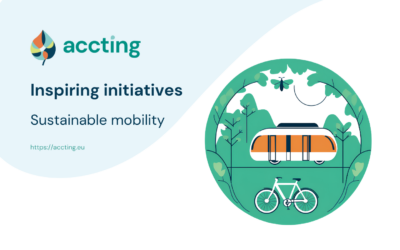
Photo by Viktor Mogilat
When the COVID-19 pandemic broke out, we all saw our cities deserted for a few weeks, without the traffic that usually engulfs and suffocates them day and night. We somehow hoped that the crisis would represent an opportunity to rethink urban mobility, in a transition towards more sustainable alternatives.
However, the pandemic has paradoxically increased the use of cars and private transport, due to the fear of contagions, quite persistently reducing the use of public transport. The current energy crisis, on the other hand, may push again in the opposite direction, due to rising fuel prices.
Between the two crises, what remains clear is the need to rethink urban mobility, supporting an ecological transition that does not discourage and exclude the most vulnerable segments of the population, like the elderly and people with disabilities, as well as those who might have difficulties purchasing electric cars, but also buying bicycles, personal scooters, or other alternative means of transport.
We are currently collecting narratives from citizens for the ACCTING case studies. So far, a broad set of issues is emerging, which shows how many different and interconnected problems exist. Just to mention a few examples:
- Limitations of public transport, which does not support enough people with diverse forms of disability
- Delays experienced by people using public transport due to heavy car traffic
- Lack of bike lanes, making it dangerous to move around the city during peak times
- Deeply ingrained culture and habits, making it difficult to reach a critical mass of people supporting change.
On the other hand, a wealth of initiatives, in terms of personal strategies, as well as activities of small groups and larger associations also exist, with the potential to open the way to new means of moving around the city, connected to health and fitness, while explicitly also responding to environmental concerns and the desire to reduce one’s ecological footprint. Among these:
- Diversification of the means of transport, leaving car use for specific, limited purposes
- Self-organised bicycle workshops to repair one’s bike at a minimal cost
- Collective bike-to-school and walk-to-school initiatives
- Citizens volunteering to improve the maintenance of roads and bike lanes
- Different forms of free apps to organise car sharing or support the safety of those travelling alone at night.
After the collection and analysis of narratives in six European countries (Greece, Italy, Norway, Portugal, Romania and Sweden), the most promising initiatives will be considered and discussed in more depth, in Open Studios and workshops with experts and stakeholders throughout Europe. Research will be undertaken to identify the prerequisite for their success and inform policy frameworks for inclusive urban mobility.
About the author
 Marina Cacace, social researcher at Knowledge & Innovation, has been long focusing on gender studies, and particularly science-society relations from a gender perspective. She has conducted several projects on gender equality in research institutions, while her research interests also include poverty and social exclusion and the application of the complexity perspective to evaluation activities.
Marina Cacace, social researcher at Knowledge & Innovation, has been long focusing on gender studies, and particularly science-society relations from a gender perspective. She has conducted several projects on gender equality in research institutions, while her research interests also include poverty and social exclusion and the application of the complexity perspective to evaluation activities.


